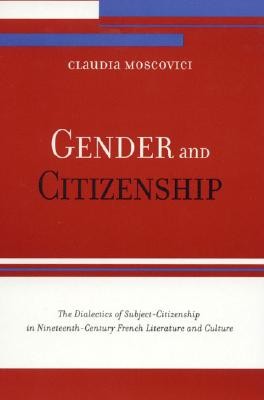
- We will send in 10–14 business days.
- Author: Claudia Moscovici
- Publisher: Rowman & Littlefield Publishers
- ISBN-10: 0847696952
- ISBN-13: 9780847696956
- Format: 14.9 x 22.8 x 1.3 cm, minkšti viršeliai
- Language: English
- SAVE -10% with code: EXTRA
Reviews
Description
Moscovici proposes a new understanding of how gender relations were reformulated by both male and female writers in nineteenth-century France. She analyzes the different versions of gendered citizenship elaborated by Friedrich Hegel, George Sand, Honore de Balzac, Auguste Comte and Herculine Barbin revealing a shift from a single dialectical (or male-centered) definition of citizenship to a double dialectical (or bi-gendered) one in which each sex plays an important role in subject-citizenship and is defined as the negation of the other sex. Moscovici further argues that a double dialectical pattern of androgyny endows women with a (relational) cultural identity that secures their paradoxical roles as both representatives and outsiders to subject-citizenship in nineteenth-century French society and culture.
EXTRA 10 % discount with code: EXTRA
The promotion ends in 22d.00:56:00
The discount code is valid when purchasing from 10 €. Discounts do not stack.
- Author: Claudia Moscovici
- Publisher: Rowman & Littlefield Publishers
- ISBN-10: 0847696952
- ISBN-13: 9780847696956
- Format: 14.9 x 22.8 x 1.3 cm, minkšti viršeliai
- Language: English English
Moscovici proposes a new understanding of how gender relations were reformulated by both male and female writers in nineteenth-century France. She analyzes the different versions of gendered citizenship elaborated by Friedrich Hegel, George Sand, Honore de Balzac, Auguste Comte and Herculine Barbin revealing a shift from a single dialectical (or male-centered) definition of citizenship to a double dialectical (or bi-gendered) one in which each sex plays an important role in subject-citizenship and is defined as the negation of the other sex. Moscovici further argues that a double dialectical pattern of androgyny endows women with a (relational) cultural identity that secures their paradoxical roles as both representatives and outsiders to subject-citizenship in nineteenth-century French society and culture.


Reviews